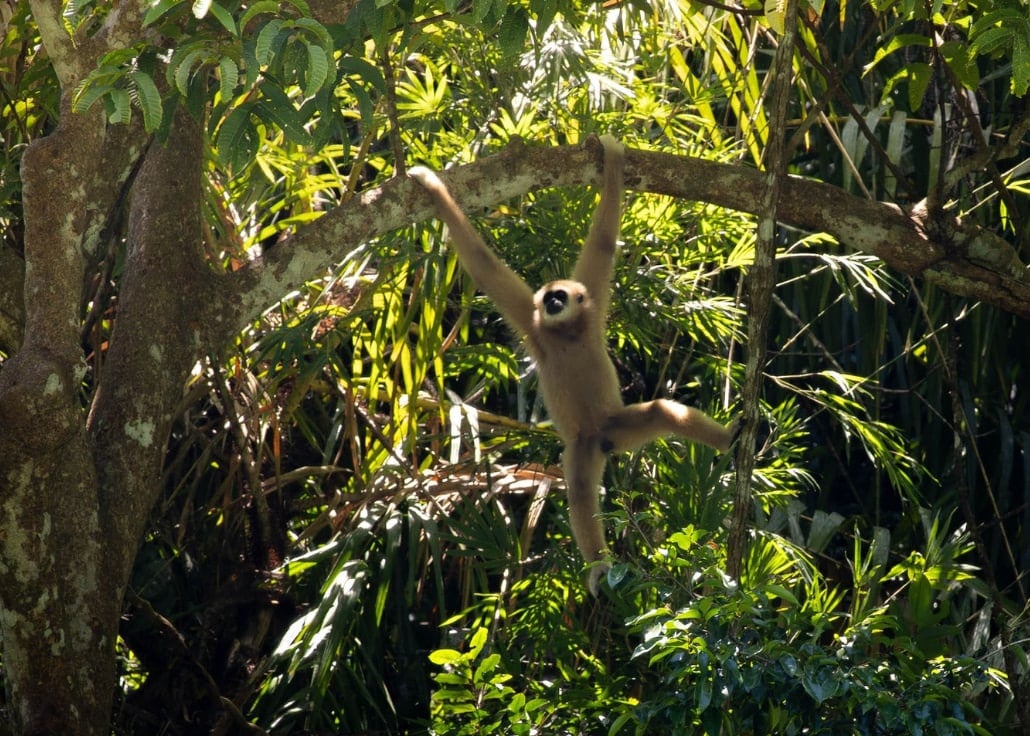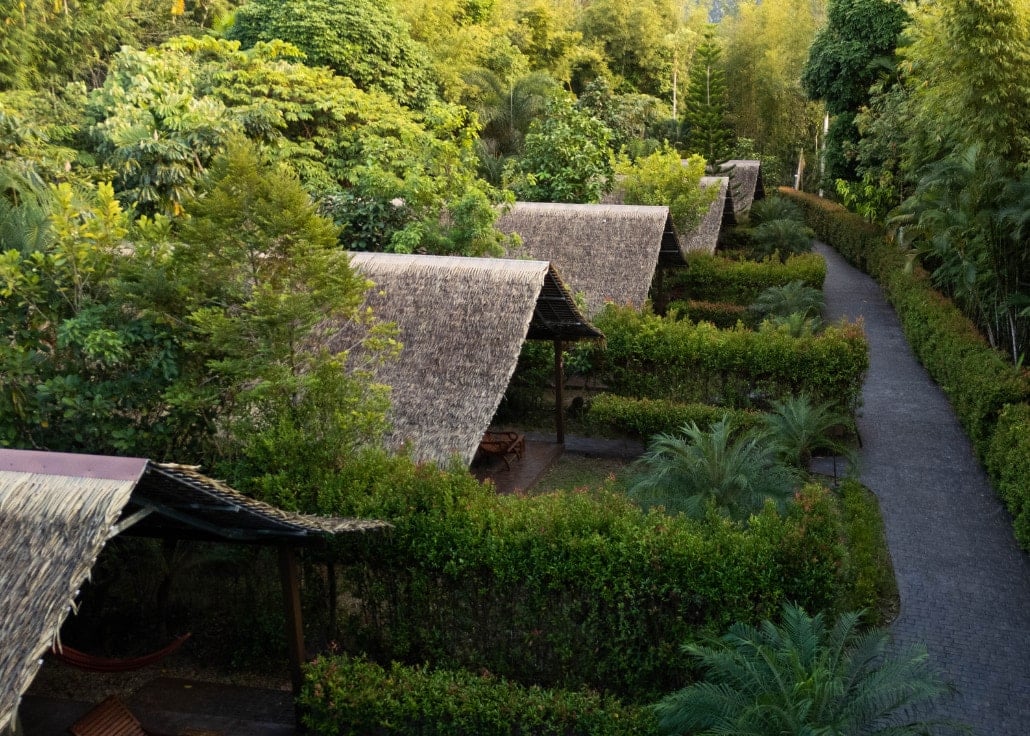
At Elephant Hills, we believe travel should inspire while protecting the places we visit. Thailand’s rainforests are some of the most biodiverse on Earth, yet they are under increasing pressure from deforestation, development, and mass tourism.
By travelling responsibly, you can help protect these precious ecosystems while enjoying unforgettable experiences. Through our floating Rainforest Camp, award-winning sustainability projects, and ethical Elephant Conservation Project, we’re proud to set the standard for responsible travel in Thailand and show how eco-conscious tourism can protect rainforests for generations to come.
Thailand’s Rainforests: Why They Matter

Thailand’s rainforests are the green lungs of Southeast Asia, storing carbon, regulating water cycles, and preserving fragile ecosystems. They are home to endangered species, including gibbons, hornbills, langurs, reptiles, and orchids, as well as the iconic Asian elephant. Around Khao Sok National Park, where we are based, you’ll find one of the oldest evergreen rainforests in the world — a living time capsule of biodiversity.
But these ecosystems are fragile. Expanding agriculture, infrastructure, and poorly managed tourism are placing them under strain. Protecting Thailand’s rainforests is about more than preserving landscapes; it is about safeguarding the species and communities that depend on them.
How Travel Can Harm or Help

Tourism has an immense influence. Managed irresponsibly, it damages habitats, pollutes rivers, and exploits wildlife. However, when done correctly, tourism can become a powerful tool for conservation. By choosing sustainable options, travellers fund jobs in conservation and education, support schools and local suppliers, and create direct incentives to keep rainforests intact.
Every holiday choice has an impact. That is why we at Elephant Hills design every aspect of our camps and tours to minimise environmental pressure while creating benefits for local communities and wildlife.
Responsible Travel in Action at Elephant Hills

For over two decades, we have pioneered eco-tourism in Thailand, demonstrating that it is possible to combine comfort with conservation. Our model includes:
- Rainforest Camp on Cheow Lan Lake, one of the world’s few floating tented camps. Powered partly by solar energy, it is designed to leave a minimal footprint while immersing guests in spectacular natural surroundings.
- Our unique, no-riding, hands-off elephant experience. Guests help prepare food and observe elephants behaving naturally, learning from our expert guides about their needs and challenges.
- Ongoing investment in sustainability projects such as plastic reduction, refill water stations, school partnerships, and responsible waste management.
- Support for wider welfare initiatives through the Elephant Conservation Project, which provides resources and care beyond our own camp.
When you choose one of our all-inclusive holidays, you’re not just booking an adventure. You’re directly contributing to the protection of Thailand’s forests and wildlife.
Your Role as a Responsible Traveller

Travellers themselves are part of the solution. By making thoughtful choices, you help conserve Thailand’s rainforests while enjoying a richer, more authentic holiday. Some simple but powerful steps include:
- Book with providers who can prove their sustainability practices, such as our all-inclusive holidays.
- Travel with a reusable water bottle and avoid single-use plastics, supported by our refill stations and plastic reduction schemes.
- Respect wildlife by observing quietly and avoiding any disturbance to animals for the sake of an Instagram photo.
- Travel outside peak dates if you can, spreading demand and easing pressure on sensitive ecosystems.
Every traveller who makes these choices helps ensure Thailand’s rainforests thrive long into the future.
Why October Planning Matters for 2025

Each October, many travellers in the UK and Europe begin planning their winter and spring holidays. With growing awareness of climate change and biodiversity loss, responsible travel is at the forefront of travel decisions. Thailand’s dry season (November to April) is the ideal time to explore rainforests and lakes, while the green season (May to October) reveals lush growth and dramatic waterfalls.
By planning your 2025 holiday now, you can ensure that your trip aligns with your values and contributes to conservation, rather than destruction.
Travel That Protects and Inspires

We believe that sustainable tourism in Thailand should leave behind not only memories but also a lasting impact. It should support wildlife, empower communities, and protect the rainforests that make this country unique. At Elephant Hills, every element of our guest experience is designed to achieve this balance. From the floating Rainforest Camp to our conservation projects, we demonstrate that eco-travel can be both comfortable and meaningful.
FAQs
1. What is responsible travel in Thailand?
Responsible travel involves selecting eco-friendly providers that prioritise the protection of wildlife, support local communities, and minimise environmental impact.
2. How does tourism affect Thailand’s rainforests?
Irresponsible tourism can damage habitats and pollute ecosystems, but sustainable tourism funds conservation and creates incentives for protection.
3. Is Elephant Hills eco-friendly?
Yes. Our camps use renewable energy where possible, reduce single-use plastics, support local schools, and prioritise ethical elephant care.
4. Can my visit really make a difference?
Absolutely. Each booking supports rainforest conservation, elephant welfare, and community initiatives through our projects.
5. What’s the best way to travel responsibly in Thailand?
Choose eco-conscious providers like Elephant Hills Thailand, avoid exploitative wildlife attractions, and minimise your environmental footprint.
Make Your Holiday Count
Explore our all-inclusive holidays and discover how responsible travel can help protect Thailand’s rainforests while providing an unforgettable eco-luxury adventure.
You might also like…
Discover The Bush Camp Chiang Mai: An Ethical Elephant Encounter
Thailand’s Cultural Gems: Unveiling Temples, Traditions & Thai Cuisine
Discover the Best of Southern Thailand: Your Guide to Phuket, Koh Samui, Krabi and Khao Lak
Khao Sok National Park – A Jungle Adventure In Southern Thailand
Honeymoon Destinations in Thailand


